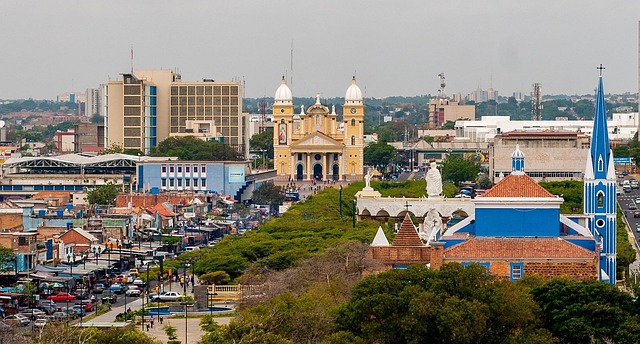By Tim Lambert
Early Venezuela
For centuries, the indigenous peoples of Venezuela lived by farming but also by hunting and fishing. Then in 1498, Christopher Columbus became the first European to reach Venezuela.
In 1499, a Spaniard named Alonso de Ojeda led another expedition to the area. He called it Venezuela, meaning little Venice, after seeing huts on stilts. The Spanish founded their first town in Venezuela in 1521. They also began importing African slaves. However, Venezuela was relatively unimportant to the Spanish.
On 5 July 1811, a national assembly declared Venezuela independent. However, it was short-lived. After a year Spanish forces were in control once again. Venezuela was finally liberated by Simon Bolivar in 1821. At first, Venezuela was joined with Colombia and Ecuador as part of a state called Gran Colombia. However, Gran Colombia soon broke up, and Venezuela became completely independent in 1830.
During the 19th century, Venezuela was ruled by military dictators called Caudillos. The first was Jose Antonio Paez. He ruled Venezuela until 1848. Venezuela then suffered civil wars. General Antonio Guzman Blanco was caudillo from 1870 to 1888, and he restored order.
However, in 1902, Venezuela failed to pay interest on loans from Britain, Germany, and Italy. As a result, those 3 nations sent their navies to blockade Venezuelan ports. However, in 191,4 oil was discovered in Venezuela. Oil became Venezuela’s most important export.
Then in 1945, a dictator was overthrown, and the interim government promised to hold elections. A new constitution was introduced in Venezuela in 1947, and elections were held. However, a coup took place in 1948. Marcos Perez Jimenez became the dictator of Venezuela. He was overthrown in turn in 1958.
Modern Venezuela
After 1958, Venezuela became a democracy. However, in 1998, Hugo Chavez was elected president. Chávez introduced a left-wing regime in Venezuela. Chávez was re-elected in 2006. He allied Venezuela with Cuba. However, Chavez died in 2013. He was replaced by Nicolas Maduro.
Today, Venezuela relies heavily on revenue from oil, but poverty persists. In 2016, Venezuela suffered a very high rate of inflation, and the economy contracted. There are also shortages of consumer goods and medicines. Venezuela also suffers from a very high crime rate.
Not surprisingly in recent years, Venezuela has suffered a ‘brain drain’ as many wealthy people have fled abroad. In 2017, there were many protests in Venezuela. Today the economic crisis continues. In 2025, the population of Venezuela was 29 million.
In 2026 US forces abducted the President of Venezuela, Nicolás Maduro.

Last revised 2026